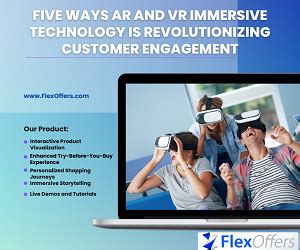Immersive technologies, including Virtual Reality (VR), Augmented Reality (AR), and Mixed Reality (MR), are transforming the way we live and work. From entertainment to education, healthcare to manufacturing, these technologies are revolutionizing various industries in unprecedented ways. In this article, we'll delve into five ways immersive tech is making a significant impact.
Enhancing Entertainment and Storytelling

The entertainment industry is one of the earliest adopters of immersive technologies. VR and AR are being used to create immersive experiences that engage audiences like never before. For instance, VR movies and games are providing a new level of interactivity, while AR is being used to create interactive filters and lenses for social media platforms.
The use of immersive tech in entertainment is not limited to just movies and games. It's also being used in live events, such as concerts and theater performances, to create a more immersive experience for the audience. For example, VR experiences are being used to transport audiences to new environments, while AR is being used to enhance the visual effects of live performances.
Key Benefits of Immersive Tech in Entertainment
- Enhanced storytelling capabilities
- Increased audience engagement
- New revenue streams for content creators
- Improved accessibility for people with disabilities
Transforming Education and Training

Immersive technologies are revolutionizing the education sector by providing interactive and engaging learning experiences. VR and AR are being used to create virtual labs, where students can conduct experiments and investigations in a safe and controlled environment.
Immersive tech is also being used to enhance training programs in various industries, such as healthcare and manufacturing. For example, VR is being used to train surgeons and medical professionals, while AR is being used to enhance the training of assembly line workers.
Key Benefits of Immersive Tech in Education
- Improved student engagement and motivation
- Enhanced learning outcomes
- Increased accessibility for students with disabilities
- Reduced costs for training programs
Improving Healthcare Outcomes

Immersive technologies are being used in various healthcare applications, including therapy, treatment, and patient education. VR is being used to treat mental health disorders, such as anxiety and PTSD, while AR is being used to enhance patient education and engagement.
Immersive tech is also being used to improve surgical outcomes by providing surgeons with real-time data and visualizations during procedures. For example, AR is being used to provide surgeons with real-time data on patient anatomy and physiology.
Key Benefits of Immersive Tech in Healthcare
- Improved patient outcomes
- Enhanced patient engagement and education
- Reduced costs for healthcare providers
- Increased accessibility for patients with disabilities
Increasing Efficiency in Manufacturing

Immersive technologies are being used in manufacturing to improve efficiency and reduce costs. AR is being used to enhance the assembly process, while VR is being used to provide workers with real-time training and education.
Immersive tech is also being used to improve quality control and inspection processes. For example, AR is being used to provide inspectors with real-time data and visualizations of products during the inspection process.
Key Benefits of Immersive Tech in Manufacturing
- Improved efficiency and productivity
- Reduced costs for manufacturers
- Enhanced quality control and inspection processes
- Increased accessibility for workers with disabilities
Enhancing Customer Experience in Retail

Immersive technologies are being used in retail to enhance the customer experience. AR is being used to provide customers with interactive and immersive product demos, while VR is being used to create immersive brand experiences.
Immersive tech is also being used to improve the shopping experience for customers with disabilities. For example, AR is being used to provide customers with visual impairments with real-time product information and navigation assistance.
Key Benefits of Immersive Tech in Retail
- Enhanced customer experience
- Increased customer engagement and loyalty
- Improved accessibility for customers with disabilities
- Increased revenue for retailers






What is immersive technology?
+Immersive technology refers to a range of technologies that create immersive and interactive experiences, including Virtual Reality (VR), Augmented Reality (AR), and Mixed Reality (MR).
What are the benefits of immersive technology?
+The benefits of immersive technology include improved engagement, increased efficiency, and enhanced customer experience.
What industries are using immersive technology?
+Immersive technology is being used in a range of industries, including entertainment, education, healthcare, manufacturing, and retail.
We hope this article has provided you with a comprehensive overview of the ways in which immersive technology is revolutionizing various industries. From entertainment to education, healthcare to manufacturing, immersive tech is transforming the way we live and work. As the technology continues to evolve, we can expect to see even more innovative applications in the future.
